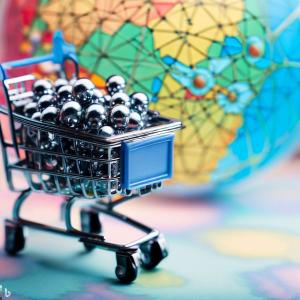NZME's Penalty for "Buckyball" Magnets Illuminates Regulatory Enforcement Gaps
The New Zealand company was fined $88k by the Commerce Commission for selling 213 sets of "buckyballs" magnets, on its previously owned deal platform.
NZME Ltd (NZE:NZM)
The fine NZME received is equal to about $250 USD per set each of the 213 magnet sets sold...”
DENVER, CO, USA, June 30, 2023/EINPresswire.com/ -- The spherical rare earth magnets (SREMs), often known as "buckyballs", have recently been the focus of a case involving NZME Advisory Limited (NZME), a publicly listed company in New Zealand. NZME was penalized $87,750 NZD by the Commerce Commission for selling 213 sets of these magnetic spheres on its platform, GrabOne.co.nz, previously owned by the company (1).— MagnetSafety.org
These small, high-powered magnets were sold between October 2020 and September 2021. The sale violated an unsafe goods notice that prohibits the supply of magnets, sold in sets of two or more, that are intended as toys, modeling kits, or jewelry, excluding those purposed for educational or industrial use.
This case drew public attention when a child in New Zealand accidentally ingested two of the magnets, necessitating extensive surgery to remove them. Following this incident, NZME recalled the magnet sets and informed customers of the recall.
The penalty levied on NZME equates to roughly $250 USD per each of the 213 magnet sets sold on GrabOne. In contrast, more than 10,000 sets of these magnets were sold on the American platform, Groupon, in one listing alone(2), with sales continuing beyond December 2022. Similar to GrabOne, products sold on Groupon are offered by third-party sellers.
The enforcement action against NZME might be viewed as a step toward enhancing consumer safety. However, despite the fine, similar magnetic products continue to be readily available from international sellers, including Chinese ecommerce sites, which can be easily found in online search results. An example is Buckyballsstore.com, a Jiangsu, China-based online store (3). This store is the same one that the US Consumer Product Safety Commission (CPSC) was able to shut down only temporarily (4).
While NZME faced a significant penalty for its actions, international ecommerce sites selling the same potentially harmful products directly to consumers in New Zealand seem to be operating with minimal restriction. This situation underscores the challenges in enforcing product safety laws on international online retailers. The New Zealand Commerce Commission has appealed the NZME fine, arguing for a higher penalty (5).
The responsibility for ensuring product safety appears to be unevenly distributed, with domestic businesses facing stricter enforcement than their international counterparts. This uneven application of regulations leaves consumers in a position where they must discern the safety of products, especially when purchasing from international sellers.
This case highlights the need for stronger international cooperation and regulation to protect consumers in the era of global ecommerce. It also emphasizes the importance of consumer awareness of product safety standards, particularly when purchasing from international online stores.
The question remains: How can regulatory bodies such as the New Zealand regulators, US CPSC, and others in different countries, effectively minimize injuries from products sold in digital marketplaces and ensure consumer safety across borders?
1.) https://comcom.govt.nz/news-and-media/media-releases/2023/nzme-fined-for-selling-dangerous-magnetic-toys
2.) https://web.archive.org/web/20221219081337/https://www.groupon.com/deals/gg-mp-5mm-multi-colored-magnetic-balls-216
3.) https://www.buckyballsstore.com/pages/about-us
4.) https://www.magnetsafety.org/releases/successful-stop-sale-of-buckyballsstore-com
5.) https://comcom.govt.nz/news-and-media/media-releases/2023/comcom-files-appeal,-argues-nzme-fine-manifestly-inadequate
* * *
The Magnet Safety Organization, also known as Magnetsafety.org, is a 501c(3) non profit organization, dedicated to promoting the safe usage of all high powered magnets among consumers and educators through research, regulatory monitoring, public outreach, and content creation.
Shihan Qu
Magnet Safety Organization
email us here
Visit us on social media:
Twitter

